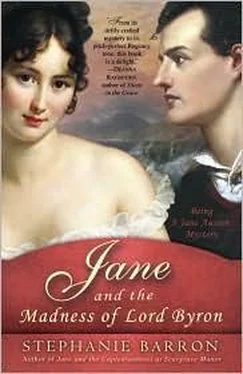I deliberately tried this information on the Captain to see how he should react; and the change his countenance underwent was remarkable. He first paled, then flushed red.
“Miss Austen—” He hesitated. “I collect that the Countess is intent upon driving home. Should you mind if I rode a little way beside your carriage? A dawdling escort might encourage her ladyship to curb her horses.”
“Then you shall earn my undying gratitude,” I returned with a smile, “and any indulgence you might name!”
The Captain remounted, Hinch swung himself up behind the phaeton, and the mettlesome chestnuts, given their heads, sprang forward with a lurch.
Until we were well out of the Camp, the talk must be all on Mona and Morley’s side—of horseflesh and auctions at Tattersall’s; the fate of a mutual acquaintance’s hunters, when that acquaintance lost everything at loo and was forced to sell his stable. “Six hundred guineas, Swithin says old Jepson paid, for that rawboned young’un,” Mona exclaimed. “We must hope it’s up to carrying Jepson’s weight.”
“Do you hunt, Miss Austen?” Morley politely enquired. We had achieved the main Brighton road, and he was obviously dawdling, keeping his handsome charger at something between a trot and a walk; I had never enjoyed a ride in Mona’s phaeton so much.
“Sadly, I do not,” I replied, “although I have many brothers who are addicted to sport. I rather wonder at your finding time to enter the field, Captain—do not your military duties take you much from England? I had heard you were at Talavera.”
“I had that honour, yes.” He dropped back from the carriage, and came round to ride beside me. “I was used to hunt with the Duke of Beaufort’s pack—but it has been at least three years since I have enjoyed a meeting.”
“—Having been perpetually fighting with Wellington in the Peninsula, I collect. Miss Twining also had a brother in the 10th, I believe—Richard Twining. Were you at all acquainted with him?”
“Indeed I was. We were tent-mates for a time. I thought poor Richard the best of fellows, and as fine a cavalry officer as ever lived. He was but nineteen when he was killed. I saw him fall.”
Mona gave a soft exclamation of sorrowful sympathy.
“It is extraordinary, is it not, that General Twining has lost both his children?” I said thoughtfully. “Almost as tho’ he had been marked out by Fate—or an avenging Fury.”
“There are some men who draw misfortune as surely as carrion draws the vulture,” he said in a taut voice. “I valued Richard Twining exceedingly, Miss Austen—but if his father should meet with the most painful death imaginable, I should greet the news with relief, and raise a glass to Heaven on the strength of it! I say this, tho’ he is a senior officer.”
“Strong words indeed, sir,” I said imperturbably. “What has the General done to inspire such implacable resentment?”
“He had a wife, ma’am, before he possessed his children—and the misery he brought upon her head cannot fail to move any who once knew her, tho’ she is many years now in her grave.”
I bowed to the Captain; his words were laden with honest emotion, and I detected no attempt at dissimulation, no effort to disguise his passionate disregard for the General. If this young man were determined to be the agent of his family’s revenge upon the Twinings—and had sought to destroy the father by extinguishing first his son, a companion in arms—and then his daughter, so trusting and young—Morley was exceedingly clever. A man who had much to hide, should have affected a careless cordiality towards the General—and I should have suspected his motives instantly. By exposing his unvarnished enmity, Morley appeared guileless; and I suspected him the more.
“But I blame myself for Miss Twining’s murder,” he said, in a lowered voice. “I spoke too freely, when I should not—I sought to protect and shield her. Instead, I served only to incite her murderer to violence.”
“Unless you held her head under the waves, Captain, you cannot possibly claim guilt.”
He looked at me in swift dismay. “I, drown Catherine ? You will acquit me of such an atrocity, I hope, Miss Austen, when I tell you that it has been many months since I have known she was the only creature on earth capable of ensuring my happiness—and that, tho’ she shrank from openly proclaiming an engagement, until she should be of age, I may say with confidence that she felt the same depth of regard for me.”
“Good God!” I said blankly. “Do not tell me that the Earl of Derwentwater’s estates lie somewhere near Bath ?”
“My family has long been established in that part of the country, indeed,” the Captain returned with a faint air of curiosity.
Thus did my brother Henry’s predicted appearance of a gallant Unknown, devoted to Miss Twining, come to pass—and as I had feared, entirely too late. A host of impressions swept over me. Catherine in love with a young officer. Catherine, sent home from school. Catherine, going in fear of disclosing her beloved’s name . But Morley was speaking, and I must attend.
“The fact of her brother having reposed his trust and friendship in me, early supported my suit; but many months of mutual esteem, and increasing knowledge of one another’s character, established the true bond.”
“Then you have all my sympathy, Captain,” I said; but I studied his classic profile in some doubt. “How did you come to meet? Miss Twining was much of the year at school, I believe, in Bath?”
“She was—but at such a remove from the General, Catherine naturally felt herself to be free of inordinate restraint. She might receive visitors, under the eye of Miss Addams, the Headmistress. I first called last November, to deliver a letter I had long held in keeping—the final one penned by her brother. Richard had told me much of his beloved sister during our long campaigning in Spain.”
“Of course,” I murmured.
“From that beginning,” the Captain continued in a voice that wavered only a little, “our attachment was constant and fervent. The knowledge that I was to be garrisoned in Brighton—where Catherine made her home—only increased our happiness—but we taught ourselves discretion, so as not to excite the animosity of her father.”
“You only danced the one dance with her, at Monday’s Assembly,” Mona observed.
The Captain turned his head. “All subterfuge must be abhorrent; but I knew the General should make Catherine’s life a misery if he suspected our mutual regard. An ancient scandal lies between our two families, which renders any marital tie repugnant to the General.”
“You were aware he intended to marry her to Mr. Hendred Smalls?” I asked.
“The Company chaplain? Catherine had spoken of the General’s threats, but did not regard the union as imminent; she pled her tender years, and the unfortunate Smalls is an elderly gentleman. He might, after all, be carried off by a putrid fever at any time,” Morley said, with the unconscious arrogance of youth, “and had he pressed his suit—or the General forced the union upon her—we should have been ready to fly to the Border at a moment’s notice.”
He was pensive a moment, the charger skittering sideways, and I observed that his pallor was extreme. “To think that it should be my darling —in all her freshness and bloom—who should be lost, and as a result of my unguarded tongue! I do not exaggerate, Miss Austen, that when I learnt of her death—of the wretched manner in which she was found—that I very nearly made away with myself. Only a consciousness of what was due to my father—to all my family—preserved me. I would not have it said that a Twining was the ruin of another generation’s hopes!”
Читать дальше












